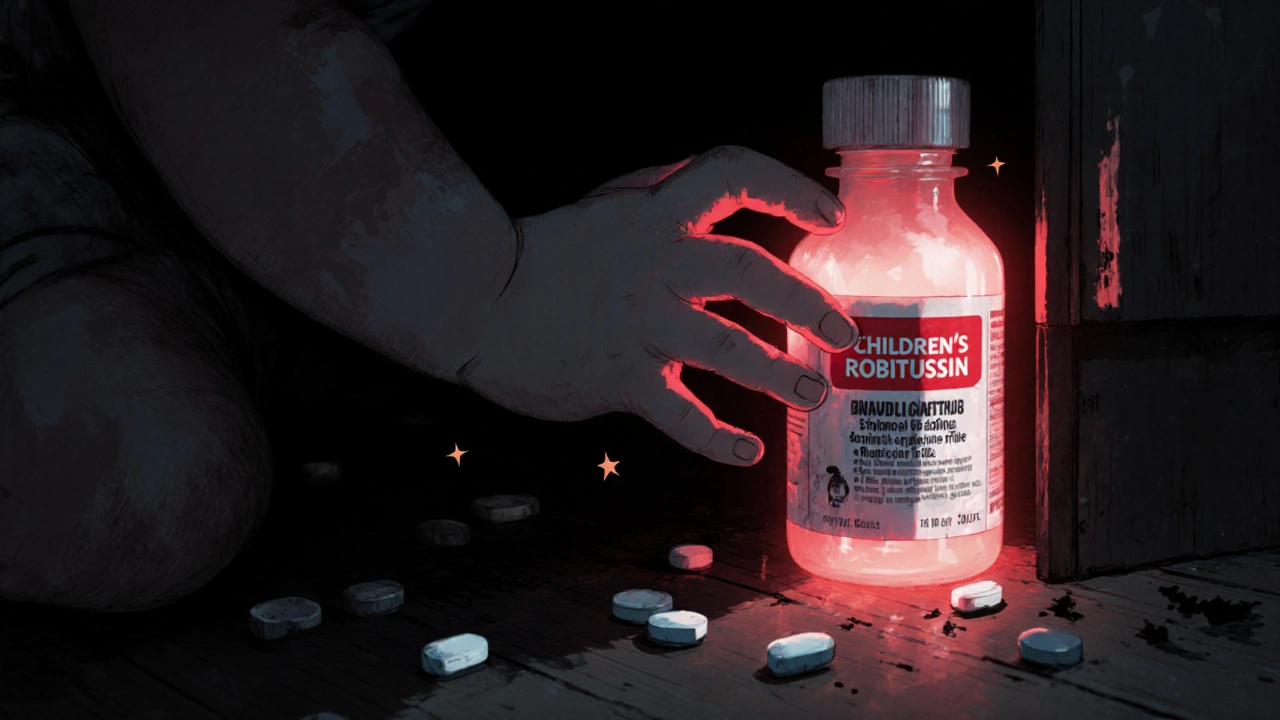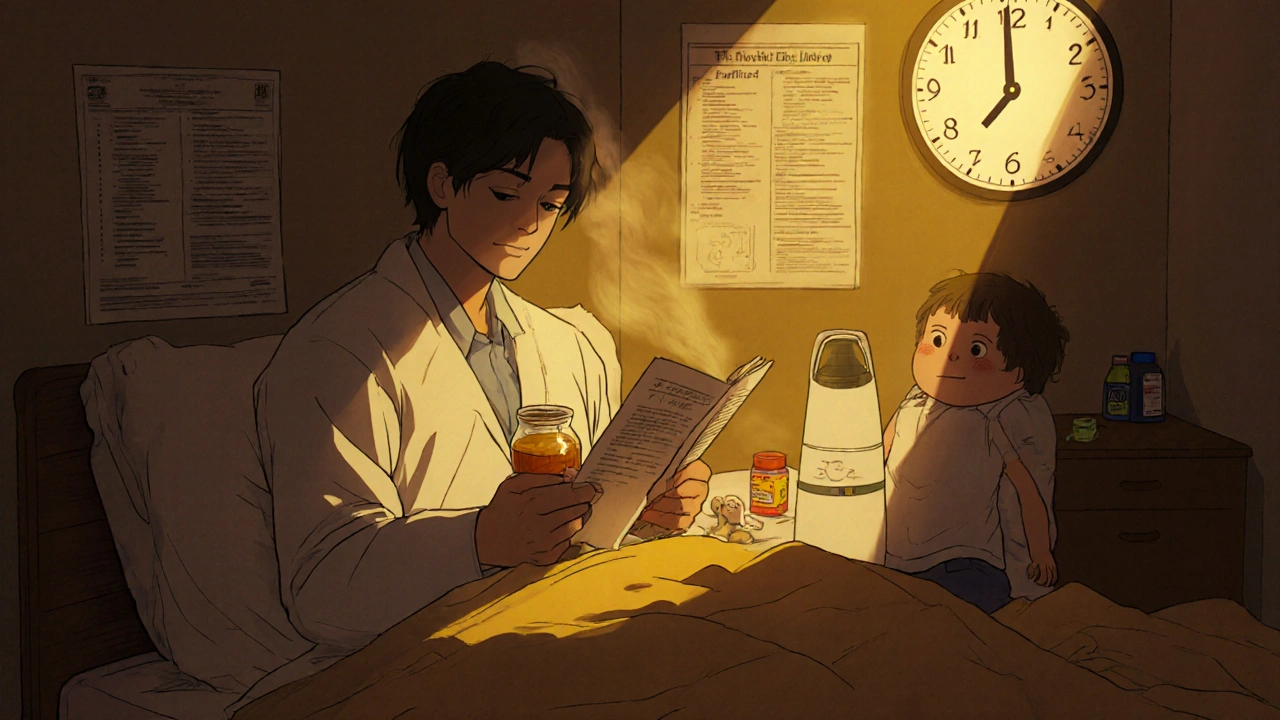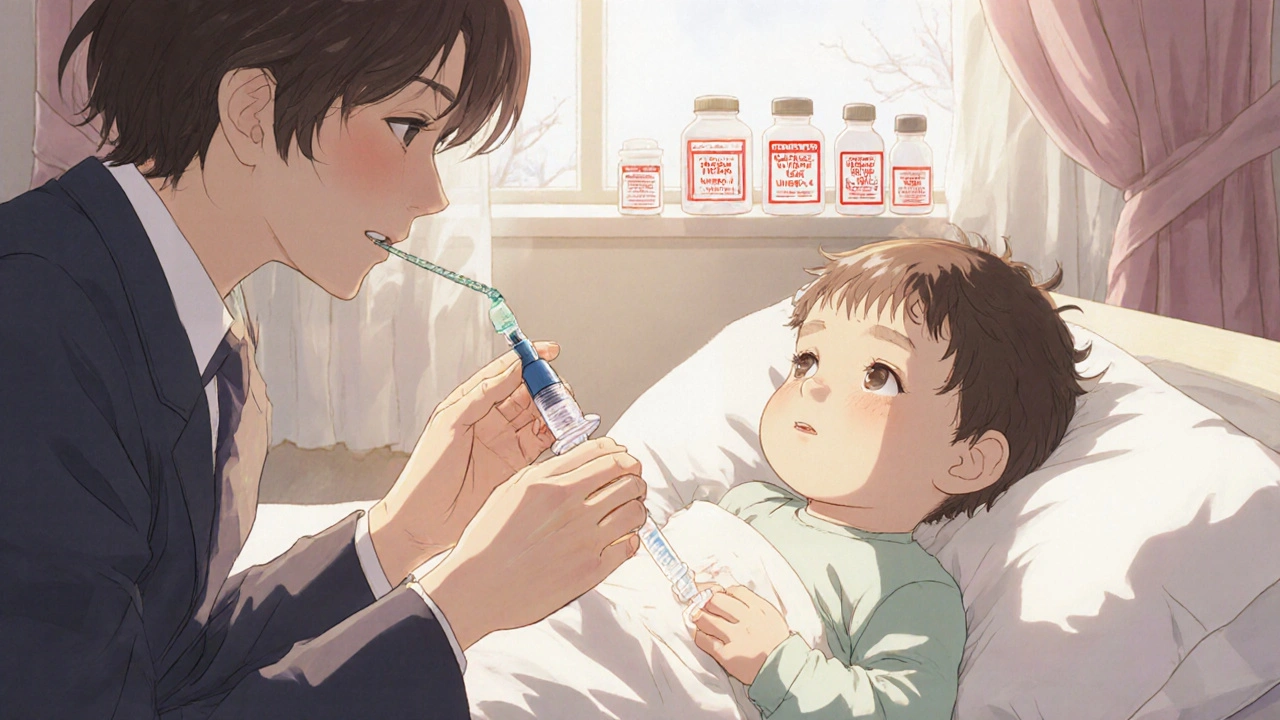Every winter, parents face the same tough choice: their child is coughing, congested, and can’t sleep, and they want to help. So they reach for the bottle of Children’s Robitussin or Dimetapp sitting in the medicine cabinet. But here’s the hard truth - OTC cold medicine isn’t safe for young kids, and giving it to them could do more harm than good.
Why OTC Cold Medicines Are Risky for Kids Under 4
The FDA and the American Academy of Pediatrics have been clear since 2008: don’t give over-the-counter cough and cold medicines to children under 4. That’s not a suggestion. It’s a safety rule backed by real data.
Between 2004 and 2015, over 1,500 children were hospitalized because of these medicines. Most were under 2 years old. Symptoms included fast heart rates, seizures, trouble breathing, and even coma. A 2012 study found that 5.2% of all pediatric drug-related emergency visits were caused by cold medicines - not from intentional overdoses, but from accidental ones. A toddler grabs a bottle, thinks it’s candy, and takes a few sips. That’s all it takes.
These medicines often contain multiple active ingredients: antihistamines like diphenhydramine, decongestants like pseudoephedrine, cough suppressants like dextromethorphan, and expectorants like guaifenesin. Most products combine two or three of these. That’s a problem because parents might give one medicine for a runny nose and another for a cough - not realizing they’re giving double the dose of the same drug. That’s how overdoses happen.
Age-Based Dosing Is Outdated and Dangerous
Look at any bottle of Children’s Mucinex or Robitussin. The label says: “For ages 2-3: 1 tsp. For ages 4-5: 2 tsp.” Sounds simple, right? But here’s what those labels don’t tell you: a 2-year-old weighing 25 pounds and another weighing 35 pounds are both given the same dose. That’s not safe.
The American Academy of Pediatrics found that age-based dosing leads to dosing errors in 23% to 37% of cases. Kids of the same age can vary wildly in weight. A 3-year-old who’s small for their age might get too much. One who’s bigger might get too little. Weight-based dosing works for acetaminophen and ibuprofen - it should work for everything else too. But it doesn’t. And that’s why poison control centers still get over 3,000 calls a year about kids getting into cold medicine.
Do These Medicines Even Work?
Even if you ignore the risks, there’s another question: do they help?
The answer is no - not for young kids. The FDA reviewed all the clinical data submitted by drug companies and found no proof these medicines relieve cold symptoms in children under 12. Not cough. Not congestion. Not runny nose. Not fever. Not even sleep.
A 2017 editorial in JAMA Pediatrics put it bluntly: “The evidence base for efficacy of these products in children is virtually nonexistent.” That’s not opinion. That’s what the science says. Meanwhile, the American Academy of Family Physicians gives these medicines a “D” rating for kids under 6 - meaning the harm clearly outweighs any possible benefit.
Some doctors argue that dextromethorphan might help older kids (6-11) with cough. But even that’s debated. The American College of Chest Physicians says no OTC cough medicine should be used in kids under 12. The risk isn’t worth it.

What Parents Are Really Doing (And Why)
Despite the warnings, a 2021 AAP survey found that 38% of parents still give OTC cold medicine to kids under 4. Why? Because they feel helpless. Their child is miserable. They’ve tried everything. And they’ve heard from friends, family, or even their own pediatrician that “it’s fine.”
But here’s the catch: only 17% of those parents actually asked a doctor. The rest are following old habits, YouTube advice, or labels that say “for children” without explaining what “children” really means.
On Reddit, one parent wrote: “I gave my 2-year-old Robitussin DM against the label because he couldn’t sleep.” That’s not rare. On Drugs.com, parents give these products 1.8 out of 5 stars for kids under 6. The top complaints? “Didn’t help.” “Made him hyper.” “He threw up.”
Meanwhile, parents of kids 7 and older give them higher ratings - 68% say it helped their child sleep. That’s the only group where there’s any real evidence of benefit. And even then, it’s modest.
What You Should Do Instead
You don’t need medicine to help your child feel better. Here’s what actually works:
- Saline nasal drops: Use 2-3 drops in each nostril, then gently suction with a bulb syringe. Do this before meals and bedtime. It clears congestion without any side effects.
- Honey: For kids over 1 year old, give 2.5 mL (half a teaspoon) of honey before bed. A 2018 Cochrane review showed it reduces cough frequency better than placebo - and it’s safer than any OTC syrup.
- Hydration: Offer water, breast milk, or formula more often. Kids need about 50 mL per kilogram of body weight extra each day when sick. Keep fluids coming.
- Humid air: Run a cool-mist humidifier in their room. Keep the humidity between 40% and 60%. Moist air loosens mucus and soothes irritated throats.
- Fever relief: If your child is uncomfortable from fever, use acetaminophen (10-15 mg/kg every 4-6 hours) or ibuprofen (5-10 mg/kg every 6-8 hours). Always dose by weight, not age. Use the measuring cup that comes with the bottle - never a kitchen spoon.
These methods are proven. They’re safe. And they don’t carry the risk of seizures or breathing problems.

What’s Changing - And What’s Coming
The market for pediatric cold medicine has shrunk by nearly 30% since 2007. Manufacturers pulled 37 products off the shelves after the FDA demanded proof they worked. Today, only a few brands remain - Mucinex, Dimetapp, Robitussin - and all now say “Do not use under 4.”
The FDA is pushing for even stricter rules. Their 2023 draft guidance wants all OTC pediatric medicines to go through clinical trials before being sold. Final rules are expected by mid-2025. The American Academy of Pediatrics is also pushing to extend the age limit to under 6 and require dosing cups that only release 5 mL at a time - which could cut overdose risk by 82%.
Europe has already gone further. Since 2009, OTC cold medicines are banned for kids under 6 across the EU. Switzerland banned dextromethorphan entirely in 2022.
Meanwhile, the market for saline sprays and humidifiers is growing fast - projected to rise nearly 10% a year through 2028. That’s not a trend. That’s a sign parents are finally listening.
Bottom Line: Don’t Risk It
Your child’s cold will run its course. It usually takes 7 to 10 days. There’s no magic pill. And there’s no safe one for kids under 4. Giving them OTC cold medicine won’t make them better faster. It might make them sicker.
If your child is under 4 and has a cold, skip the medicine cabinet. Use saline drops, honey (if over 1), fluids, and a humidifier. If they’re over 4 and still coughing, talk to your doctor before giving anything. Even then, avoid multi-symptom products. Stick to single-ingredient medicines - and only if you’re sure they’re needed.
The goal isn’t to eliminate every cough or sniffle. It’s to keep your child safe while their body heals. That’s what real parenting looks like - not reaching for a bottle, but reaching for patience, care, and science.
Can I give my 3-year-old children’s cough medicine if I cut the dose in half?
No. Even a half-dose can be dangerous. Children’s bodies process these drugs differently than adults. A dose that seems small to you might still be toxic to a toddler. The FDA says these medicines aren’t safe for kids under 4 - no matter how much you reduce it. Stick to non-medication options like saline drops and honey.
Is honey really safe for toddlers?
Yes - but only for children over 1 year old. Honey can contain spores of Clostridium botulinum, which can cause infant botulism in babies under 12 months. That’s why it’s not safe for infants. But for toddlers and older kids, honey is a safe, natural cough suppressant. A half-teaspoon before bed has been shown to reduce nighttime coughing better than many OTC syrups.
What if my child has a fever and a cough - can I give them acetaminophen and cold medicine together?
Never combine them. Most cold medicines already contain acetaminophen or ibuprofen. Giving extra fever medicine on top can lead to accidental overdose - which can cause liver damage or even death. If your child has a fever, use acetaminophen or ibuprofen alone. For cough or congestion, use saline, honey, or a humidifier. Don’t mix.
Are natural or herbal cold remedies safe for kids?
Not necessarily. “Natural” doesn’t mean safe. Many herbal supplements aren’t regulated, and some contain hidden ingredients like antihistamines or stimulants. Products labeled “for children” can still be dangerous. Stick to what’s proven: saline, honey, fluids, and humidifiers. Avoid unregulated herbal drops, essential oils, or teas unless your pediatrician approves them.
When should I call the doctor?
Call your pediatrician if your child has trouble breathing, a fever over 102°F that lasts more than 3 days, is not drinking fluids, has blue lips or fingernails, or seems unusually sleepy or irritable. These aren’t normal cold symptoms. They could signal something more serious - like pneumonia or croup. Don’t wait for the cough to get worse. Trust your instincts.
What to Do Next
Check your medicine cabinet right now. Look for any cold, cough, or flu products labeled for children. If they’re meant for kids under 4, throw them out. If they’re for older kids, read the label carefully. Are they multi-symptom? If yes, avoid them. Stick to single-ingredient options only if needed.
Keep saline drops, a bulb syringe, honey, and a humidifier on hand. These are your real tools for managing colds. And when in doubt - call your doctor. You don’t need to guess. You don’t need to risk it. There’s a safer way.

Jennifer Walton
November 15, 2025 AT 18:40Parents just want to fix things. But sometimes, the fix is worse than the problem.
Kihya Beitz
November 17, 2025 AT 16:24So let me get this straight - we’re telling parents to sit there while their kid wheezes like a broken accordion… because science says ‘nope’? 😒
Meanwhile, the pharma bros are sipping champagne on their yachts. Classic.
ASHISH TURAN
November 18, 2025 AT 12:17I’ve seen this in India too - grandparents give cough syrups like candy. No one reads labels. We need community education, not just FDA warnings.
Ryan Airey
November 19, 2025 AT 00:43Anyone who still gives Robitussin to a 2-year-old deserves to be reported to child services. This isn’t parenting - it’s negligence wrapped in a ‘but I just wanted to help’ blanket.
Hollis Hollywood
November 19, 2025 AT 13:48I remember when my daughter was sick at 18 months - I spent three nights holding her upright because she couldn’t breathe lying down. I wanted to give her something, anything. I didn’t know it was dangerous. I felt so guilty after reading this. Not everyone has access to good info. We need better outreach, not just judgment.
Aidan McCord-Amasis
November 19, 2025 AT 22:24Saline drops > syrup. 🤦♂️
Honey > dextro. 🍯
Humidifier > lies. 💨
Stop poisoning your kids. 🙏
Adam Dille
November 20, 2025 AT 20:49Love that this post doesn’t just say ‘don’t do it’ - it gives you what to do instead. That’s the difference between being a critic and being helpful. Seriously, thank you. I threw out my kid’s cold meds last week after reading this. Felt like a weight off my shoulders.
Katie Baker
November 21, 2025 AT 04:15My 3-year-old had a bad cough last winter. I used honey before bed and it actually worked better than the syrup I had lying around. He slept. I slept. No side effects. I’m never going back.
John Foster
November 21, 2025 AT 06:48There’s a deeper layer here, beyond dosage charts and FDA guidelines. We live in a culture that equates intervention with care. If you don’t ‘do something,’ you’re perceived as uncaring. But real care is restraint. It’s sitting with discomfort. It’s resisting the urge to medicate because you can’t bear to see your child suffer. The pharmaceutical industry profits from our fear - not our love. And until we confront that, no warning label will be enough.
Edward Ward
November 21, 2025 AT 20:23Let’s be precise: the issue isn’t just ‘OTC cold meds are dangerous’ - it’s that the labeling system is fundamentally broken. Age-based dosing is pseudoscience. Weight-based dosing is the standard for every other pediatric medication. Why is this exception tolerated? And why do manufacturers still get away with printing ‘for children’ on bottles that contain toxic combinations? The regulatory failure here is systemic - and it’s not just about parents being careless. It’s about corporations exploiting a lack of oversight. We need mandatory clinical trials for every pediatric formulation, not just after the bodies pile up.
Andrew Eppich
November 21, 2025 AT 21:41It is regrettable that many individuals persist in disregarding medical advisories. The consequences are not theoretical. They are documented, quantifiable, and tragic. Responsibility is not optional in matters of child health.
Jessica Chambers
November 23, 2025 AT 11:15My mom gave me Robitussin when I was 3. I was fine. So I gave it to my kid. 😏
Then he got hyper and threw up. Now I use honey.
Also… I’m still mad at my mom.
Shyamal Spadoni
November 24, 2025 AT 08:43Did you know the FDA is controlled by Big Pharma? They only ban stuff when it stops being profitable. Cold meds are still sold because they make billions. The ‘no under 4’ rule? A PR move. They’ll bring it back under a new name in 5 years. Trust no one. Even ‘science’ is a tool of control. I don’t give my kid anything - not even honey. Just water and silence. Let nature take its course. The system wants you dependent. Don’t fall for it.
Ogonna Igbo
November 25, 2025 AT 05:00In Nigeria we use herbal mixtures - bitter leaf, ginger, garlic. No chemicals. No side effects. Why are Americans so scared of natural remedies? You have access to everything but you choose poison because it’s convenient. Your culture is sick. Not your kids. Your mindset.
BABA SABKA
November 25, 2025 AT 17:47Look, I get the science. But in the real world - 3am, kid screaming, no pediatrician on call - you do what you can. I gave a half-dose once. Kid slept. No ER. So don’t come at me with your ‘perfect’ solutions. Real parents aren’t reading JAMA Pediatrics at midnight. They’re holding their child and praying. The system failed them first. Don’t blame the parent. Fix the system.